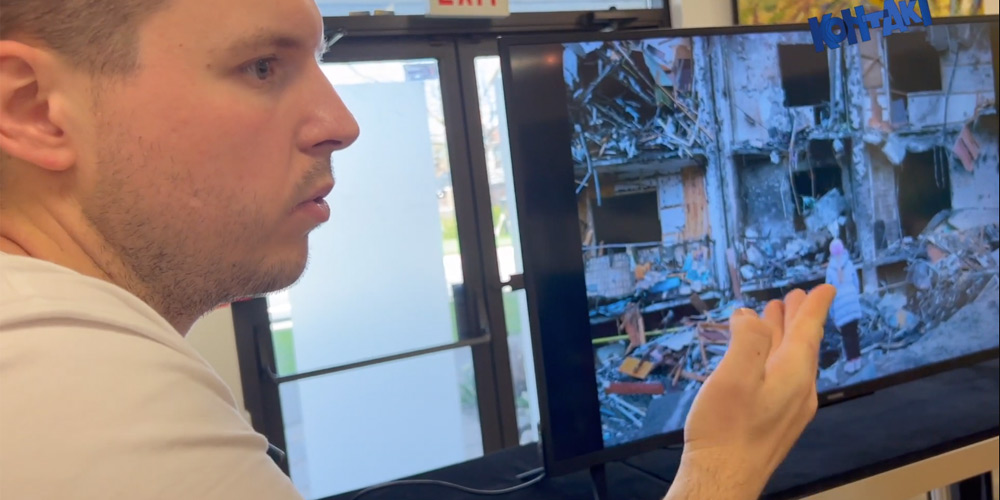
Anton Skyba would like to point out that Ukraine is a country in transition; it is not, as he puts it, a “sustained and developed democracy.” At least not yet.
The Ukrainian photojournalist, who regularly works with The Globe and Mail, offers that as context for a pattern that’s emerged of the state attempting to pick and choose which journalists get to cover its war effort and how.
Ukraine has increasingly taken to withholding accreditation privileges from journalists whose coverage they believe doesn’t actively support their national interests, or whose loyalty they deem in question. Accused of holding a Russian passport (which he emphatically denies), Skyba was told he’d need to submit to a lie-detector test before he’d be allowed to continue covering the conflict; only following direct intervention by Canadian Prime Minister Justin Trudeau did the Ukrainian government agreed to renew his accreditation without it.
Ukraine has also revoked press credentials from a New York Times reporter following his reporting on the country’s use of cluster bombs, from NBC News after one of their crews entered Crimea via Russia, and from reporters for CNN and domestic Ukrainian outlets. (In some cases, as with Skyba, the decision was later reversed.)
On this week’s CANADALAND, Sarah Lawrynuik speaks to Skyba in Ukraine, about the tenuous state of the country’s press freedoms, and Jesse Brown speaks to The Grayzone’s Aaron Maté about how Ukraine’s Security Service unsuccessfully tried to get his Twitter account shut down:
Below are edited excerpts from Lawrynuik’s interview with Skyba:
What is it you were told about why your accreditation renewal was denied?
The most recurring phrase that the officer who interrogated me told me was “I don’t see you as an enemy, but I have doubts that your work is aligned with national interests of Ukraine.”
What does it mean, “serving the national interests”? It’s very hard to divide my personal feelings on that and my professional feelings on that. Because from a professional point of view, it’s a pure establishing of control over the job I’m doing. If my job is not aligned to national interests of Ukraine, does that mean that I can’t do journalism here?
For me, it’s clear that now Ukraine is doing whatever to win this war. That’s why they are trying to fight the enemy on any battlefield possible — not just the physical battlefield, but informational warfare, etc. And there is a lot of Russia disinformation here and Russian propaganda and Russian narratives, which are trying to penetrate through the Ukrainian communication field. However, asking professional journalists about serving international interests is probably the most stupid thing they could ever ask. Even professional journalists do not serve the government of Ukraine; they serve Ukrainian society. As a Ukrainian journalist, I’m working for the society, for public interest, but not for the government interest.
There are some inherent rules that we do follow to get the accreditation, like we won’t report on exactly where a missile strike is…
I’m absolutely fine with that, because it’s not okay if the journalism harms the army or civilians or whatever, because our main principle is do not do harm but to tell the story. However, talk about “national interests” — it’s a very, very vague definition, and the government could put whatever they want into this definition. For me, it’s the biggest concern in this story.
It’s clear that now the government of Ukraine, they also see the informational sphere as a part of the warfare, and they are fighting in this sphere. They are also trying to establish more and more control here in this field as well, among the journalists. And we hear all the stories where journalists reported something bad or that the government didn’t like, and they suspend accreditation. They strip accreditation. It shouldn’t be this way.
The journalist’s job is very clear. It’s just to report what you see and to fact-check and to verify to your audience, like, is this information legit or not? Ukraine is a very hostile and hazardous environment. So all those Ukrainian journalists who are fighting here for media rights, they are like heroes. They are double heroes, because, from one side, they report war crimes committed by Russia. But from the other side, they are trying to build a better environment here. So that’s why I’m concerned and I insist that media freedom should be in the attention of our Western partners and countries, and it should never be put out from the agenda — at least ’til the end of the war. During martial law, media freedom is the first thing which would be the easiest thing to crack down on.
Are you more widely concerned about press freedom in Ukraine?
Yeah. Like, I clearly understand now we’re in martial law and the challenge Ukraine is facing right now: it’s the biggest conflict since World War II in Europe, by scale.
My main concern is that it’s not the only war which Ukraine has. Another war which Ukraine has is a war for democracy. Ukraine is not a sustained and developed democracy, as it has been perceived in the Western countries, because it’s still a country in transit. Like, nine years ago, people were fighting against a dictatorship that was building an authoritarian state and then which escaped to Russia. And Ukraine started to reform itself after that. And for nine years, a lot of reforms, process reforms simply haven’t finished yet. And if we are talking about fighting corruption, media freedom, law enforcement, etc., Ukraine is still the country in transit who is facing the hugest challenge to fight for its existence. But in the meantime, Ukrainians should fight for the democracy inside. And the media freedom is one of these aspects. The governmental control over media doesn’t help.
Top screenshot from KONTAKT TV‘s coverage of Anton Skyba’s May visit to the Ukrainian Canadian Art Foundation / KUMF Gallery in Toronto.